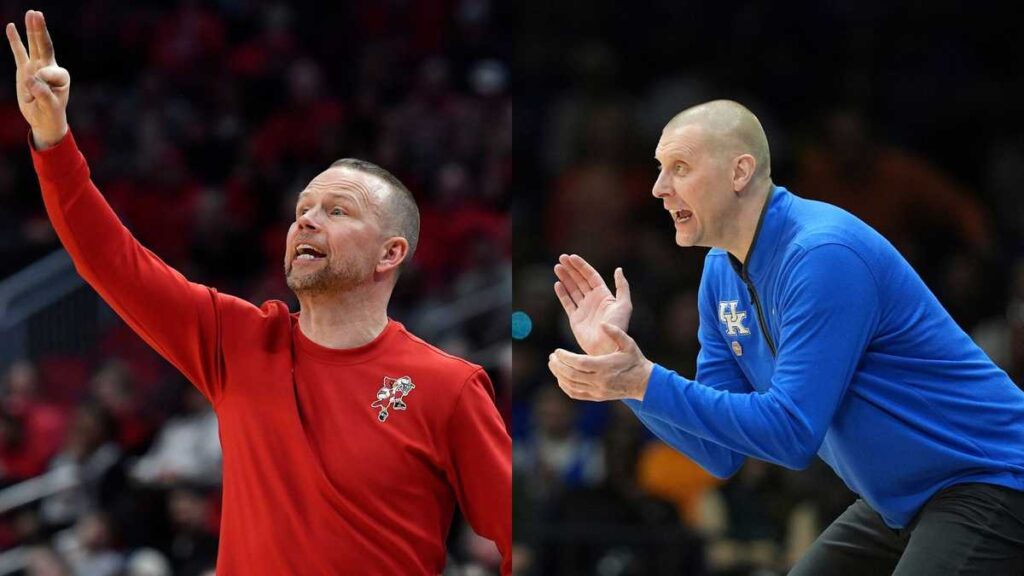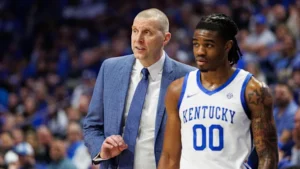
The Annual Rivalry: Louisville Cardinals vs. Kentucky Wildcats
Rivalries are a cornerstone of college sports, and few rivalries are as intense and heated as the one between the Louisville Cardinals and the Kentucky Wildcats. This annual matchup between two of Kentucky’s most prominent universities has become a highly anticipated event, bringing with it a level of passion and emotion that is difficult to rival. Fans from both sides mark their calendars for this game months in advance, eagerly awaiting the opportunity to see their team battle it out on the field, or court, depending on the sport.
Recently, a significant development has emerged in the context of this rivalry: the date of the game has been set earlier than usual. This shift in scheduling has sparked widespread discussion, leaving fans and analysts alike wondering how it will impact the tradition and intensity of the matchup. In this article, we’ll take an in-depth look at the Louisville-Kentucky rivalry, examine the history behind their annual contests, and explore the significance of this early date change.
The rivalry between the University of Louisville (U of L) Cardinals and the University of Kentucky (UK) Wildcats dates back over a century. The two schools have a long history of competition in a variety of sports, but their rivalry is perhaps most prominently associated with basketball and football. Although the teams have not always been in direct competition for national championships, the pride of each school and the fervor of their fan bases make every encounter between them significant.
While Louisville and Kentucky have both had successful athletic programs, their rivalry didn’t truly take shape until the 20th century. Early on, the two schools didn’t compete in as many sports against each other as they do now. Their first recorded football meeting took place in 1912, and their first basketball game came just a few years later, in 1913. These early contests were not necessarily marked by the same intense emotions that characterize their current matchups, but they laid the foundation for the deep-seated rivalry that would eventually develop.
One of the pivotal moments in the rivalry’s growth came in the 1980s. At this time, both programs began to rise to national prominence. The University of Kentucky, with its rich basketball history, continued to be a powerhouse in college hoops. Meanwhile, the University of Louisville, under coach Denny Crum, also became a major contender, winning the 1980 and 1986 NCAA championships. These successes intensified the rivalry, as the two schools fought not only for bragging rights but also for supremacy in the state of Kentucky and, in some years, national recognition.
Of the two sports that have defined the rivalry, basketball has arguably been the most fiercely contested. The Louisville Cardinals and Kentucky Wildcats share a mutual disdain for each other that is especially evident on the hardwood. The games between these two teams often have a postseason-like atmosphere, with both fanbases fully engaged, creating a palpable tension in the air. These matchups are regularly high-stakes affairs, with NCAA Tournament implications sometimes on the line.
Throughout the years, both teams have had their share of success. Kentucky, historically, has been a dominant force in college basketball, boasting a rich legacy with numerous national championships. The Wildcats’ success under legendary coaches like Adolph Rupp, Joe B Hall, Eddie Sutton, and most recently John Calipari, has made them one of the most storied programs in college basketball history.
On the other hand, Louisville has also enjoyed periods of greatness. With coaches like Crum, Rick Pitino, and Chris Mack, the Cardinals have been competitive and have had notable success, including a national championship in 2013. Louisville’s basketball program has long prided itself on an up-tempo style and tough defense, often contrasting with Kentucky’s more traditional approach.
One of the most memorable basketball games in recent history was the 2012 matchup between the two teams, where Kentucky narrowly defeated Louisville in the Final Four. This game epitomized the intense nature of the rivalry, as both teams fought tooth and nail for a spot in the national championship game. The Wildcats ultimately went on to win the national title that year, but for Louisville fans, the bitterness of the loss would linger.
Though not as historically significant as basketball, the football rivalry between Louisville and Kentucky has become increasingly important in recent years. Both teams have seen periods of success in college football, and the annual showdown between them has grown in stature, particularly since Louisville’s move to the Atlantic Coast Conference (ACC) in 2014.
For Kentucky, football has always been somewhat secondary to basketball, but the Wildcats have built a more competitive football program in recent years under coach Mark Stoops. Kentucky has enjoyed multiple bowl appearances and even won the Citrus Bowl in 2018. For Louisville, football has also taken center stage, especially with the rise of quarterback Lamar Jackson, who won the Heisman Trophy in 2016. The rivalry games in football are similarly intense, though they often don’t get the same level of national attention as the basketball matchups.
The outcome of these football games can have lasting implications for both schools, as the results often determine bowl placements and can affect recruiting for both programs. With each team striving to outperform the other, the football rivalry has seen several close, high-stakes contests in recent years.
Historically, the annual Louisville-Kentucky rivalry games in basketball and football have been scheduled later in the season, often in December or even early January. This timing has allowed the rivalry to serve as a culminating event for the year, intensifying the stakes and drawing significant media attention. However, this year, the date has been moved earlier than usual, creating a shift in the dynamics surrounding the game.
The decision to schedule the game earlier could be driven by a variety of factors. For one, the schools’ athletic departments may want to maximize the exposure of the game during a time of year when the college sports calendar is not as crowded. With other major conferences and bowl games dominating the headlines in the later months, an earlier game could draw more attention and provide a greater platform for the rivalry to shine.
Another reason for moving the date could be logistical. With both teams likely preparing for other major conference matchups, shifting the rivalry game to an earlier date could allow each school to focus more intently on their respective seasons without the distraction of a late-season rivalry game hanging over them. This may allow both programs to treat the matchup with the seriousness and intensity it deserves without the added pressure of chasing postseason positioning in the final weeks of the season.
For the players and coaches, this early-game change might affect how they prepare. Traditionally, the rivalry games have been seen as high-stakes season-defining contests. An earlier date could mean that both teams have less time to assess their opponents or to make adjustments based on earlier games in the season. Coaches may need to adjust their strategies, possibly treating the game as an opportunity for early-season momentum rather than a final test of the season.
For fans, this change could be both exciting and challenging. On one hand, an earlier game means that they won’t have to wait as long to experience the thrill of the rivalry. It could inject some early-season energy into the competition and build anticipation for the rest of the season. Fans might feel that this earlier timing allows for a fresh start, a chance to see the two teams meet before the grind of the full season takes its toll.
However, an earlier game could also change the dynamics of fan expectations. Because the rivalry is often a climactic event, having it earlier might take away some of the traditional build-up that has made the Louisville-Kentucky games so thrilling. For fans, there’s also the risk that one team might enter the game unprepared or not at their peak, depending on how their season is unfolding.
The decision to move the game to an earlier date could set a precedent for future matchups between Louisville and Kentucky. If the experiment proves successful in terms of fan engagement, media attention, and competitive balance, it’s possible that this could become a regular scheduling change for the rivalry. As both schools continue to grow their athletic programs and face off against other powerhouse teams, the timing of this game may evolve to better fit the needs and strategies of each program.
However, it’s also possible that fans and alumni may push back if they feel the earlier game diminishes the significance of the rivalry. Given the passionate support both schools enjoy, any major shift in tradition is always met with scrutiny. Time will tell whether this change in scheduling will be seen as a positive move for the rivalry or a disruption of long-standing traditions.
The Louisville Cardinals and Kentucky Wildcats rivalry is one of the most fiercely competitive and historically significant in college sports. Whether in basketball or football, these matchups never fail to deliver intense action and passionate fan support. The decision to move the game to an earlier date is a significant change, one that could have far-reaching implications for the future of the rivalry. Only time will tell how this shift in scheduling will affect the nature of the games, but one thing is certain: this rivalry will continue to captivate fans and make headlines for years to come.
With both teams continuing to compete at a high level, and with the rivalry showing no signs of slowing down, the annual Louisville-Kentucky matchup remains one of the most anticipated events in college sports—no matter when it happens.





